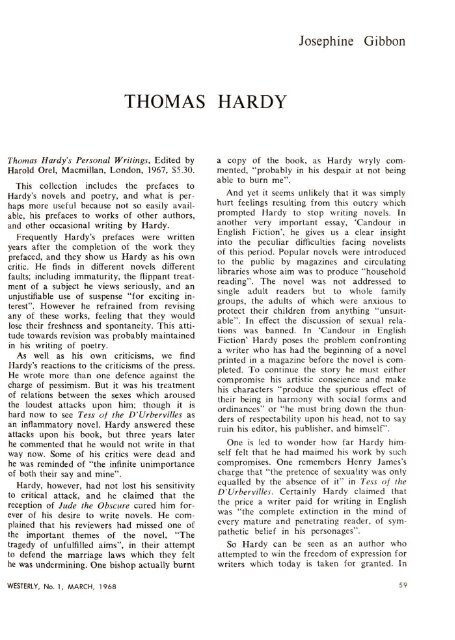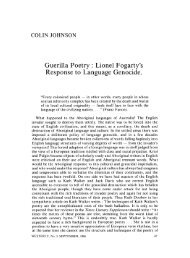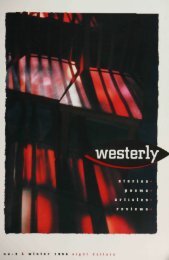And yet perhaps both men drew from thepoverty of Ireland a grim respect for thesecurity which property can bring, and a determinationto be masters of property. Certainlyno rational economic calculation canexplain entirely the consuming land-hungerwhich led the Duracks and the Costellos andtheir kin to throw their possessions, their wives,and their young children into the harsh andhazardous Cooper country of Queensland—andhaving won through to prosperity there, tostart in on another round of pioneering in aKimberley district which, at the time of itsopening, was two years' overlanding awayfrom supplies and markets. This willingnessto hazard all one's resources in the cause ofdevelopment, trusting to skill and Providenceto justify the venture, is a recurrent featurein the history of Northern development; itis the same vindication with which Mr CharlesCourt defends the Ord Scheme against thecriticism of Sir Mark OUphant. And yet, too,one gets the feeling that what interested thepioneer Duracks—we shan't pursue the analogywith Mr Court—was the venture as an end initself, the excitement of pitting one's witsagainst the environment and wresting successfrom it. When success came, as it came toPatrick Durack on Thylungra in Queensland,he hardly seemed to know what to do with it.He concentrated all his energies into the newKimberley scheme, and, ceasing to pay attentionto his Queensland properties, lost themthrough unwise investment in city real estateand through bringing his properties into a companypartnered by speculators who were lesssound than they looked. So he failed at last inQueensland, and it was the Kimberley venturewhich had to support his sons.And this relationship between father andsons touches on an Australian theme whichneeds further exploring. Sociologists who havestudied the man on the land in Austraha informus that many farmers and graziers regardtheir properties as an extension of their personalities,and gain a good deal of assurance fromthe notion of building up something for theirsons to inherit. In the case of the Duracks, thisfeeling was reinforced not only by Irish clannishness,as evidenced by the continuing chainmigration through which Patrick Durack assistedremote kinsfolk and friends to emigrateto Australia' but also—and this is more unexpected—witha firm belief in primogeniture.The future was clearly planned for youngDuracks. Younger sons might go into theprofessions, for like many of the Irish, theolder Duracks had a naive but powerful respectfor learning; but the elder sons weredestined irrevocably to inherit and manage thefamily's lands. So it was Patrick's first-born,the intellectual and unhandy M. P. Durack,who had to shoulder the burden of the Kimberleyinheritance. Contrary to his father'sadvice and experience he chose to take partnersfor the Kimberley holdings; contrary tohis sons' advice and experience, he determinedin the last month of his fife in 1950 to sellout all but a rump of the family properties,deliberately abandoning the task which hisfather had set him to carry out throughout hislong life. If that hackneyed term 'a love-haterelationship' has any vahdity, it describes M.P. Durack's reactions to the Kimberleys. Hewas the perfect foil to his uncompUcated andexuberant father, and although his career isbarely sketched in the concluding chapters ofthe book, enough is stated to draw an effectivecontrast. There have been so many fathers inAustralia like Patrick Durack, men who havefounded properties, built up businesses, madea great name in law or politics—and then lefttheir sons the problems of living up to the inheritance.Compared with many second generationinheritors, M. P. Durack asserted hisown personaUty rather successfully; but notwithout difficulty.One could go on reflecting about the manyissues raised in Kings in Grass Castles, but Iwant to end by making one comment about itstechnical construction which partly accountsfor its success. It is one of the very few historicalworks where, besides using the orthodoxtools of the historian, it has been possible todraw on oral history to give the actual wordsand intonations of past conversations. Normallybiographers who want to enliven theirnarratives with direct speech have either toinvent—which is a gross malpractice in history—or to forego the idea. Because of reUableand extensive family traditions, Mary Durackhas been able to quote the speech of her charactersfairly, accurately and vividly. This is arare stroke of luck; but it makes for aneminently readable narrative.WESTERLY, No. 1, MARCH, 1968
Josephine GibbonTHOMAS HARDYThomas Hardy's Personal Writings, Edited byHarold Orel, Macmillan, London, 1967, $5.30.This collection includes the prefaces toHardy's novels and poetry, and what is perhapsmore useful because not so easily available,his prefaces to works of other authors,and other occasional writing by Hardy.Frequently Hardy's prefaces were writtenyears after the completion of the work theyprefaced, and they show us Hardy as his owncritic. He finds in different novels differentfaults; including immaturity, the flippant treatmentof a subject he views seriously, and anunjustifiable use of suspense "for exciting interest".However he refrained from revisingany of these works, feeling that they wouldlose their freshness and spontaneity. This attitudetowards revision was probably maintainedin his writing of poetry.As well as his own criticisms, we findHardy's reactions to the criticisms of the press.He wrote more than one defence against thecharge of pessimism. But it was his treatmentof relations between the sexes which arousedthe loudest attacks upon him; though it ishard now to see Tess of the D'Urbervilles asan inflammatory novel. Hardy answered theseattacks upon his book, but three years laterhe commented that he would not write in thatway now. Some of his critics were dead andhe was reminded of "the infinite unimportanceof both their say and mine".Hardy, however, had not lost his sensitivityto critical attack, and he claimed that thereception of Jude the Obscure cured him foreverof his desire to write novels. He complainedthat his reviewers had missed one ofthe important themes of the novel, "Thetragedy of unfulfilled aims", in their attemptto defend the marriage laws which they felthe was undermining. One bishop actually burnta copy of the book, as Hardy wryly commented,"probably in his despair at not beingable to burn me".And yet it seems unlikely that it was simplyhurt feelings resulting from this outcry whichprompted Hardy to stop writing novels. Inanother very important essay, 'Candour inEnglish Fiction', he gives us a clear insightinto the peculiar difficulties facing novelistsof this period. Popular novels were introducedto the public by magazines and circulatinglibraries whose aim was to produce "householdreading". The novel was not addressed tosingle adult readers but to whole familygroups, the adults of which were anxious toprotect their children from anything "unsuitable".In effect the discussion of sexual relationswas banned. In 'Candour in EnglishFiction' Hardy poses the problem confrontinga writer who has had the beginning of a novelprinted in a magazine before the novel is completed.To continue the story he must eithercompromise his artistic conscience and makehis characters "produce the spurious effect oftheir being in harmony with social forms andordinances" or "he must bring down the thundersof respectability upon his head, not to sayruin his editor, his publisher, and himself".One is led to wonder how far Hardy himselffelt that he had maimed his work by suchcompromises. One remembers Henry James'scharge that "the pretence of sexuality was onlyequalled by the absence of it" in Tess of theD'Urbervilles. Certainly Hardy claimed thatthe price a writer paid for writing in Englishwas "the complete extinction in the mind ofevery mature and penetrating reader, of sympatheticbelief in his personages".So Hardy can be seen as an author whoattempted to win the freedom of expression forwriters which today is taken for granted. InWESTERLY, No. 1, MARCH, 1 968 59
- Page 1 and 2:
westerlyA QUARTERLY REVIEW PRICE 60
- Page 3:
westerlya quarterlyreviewEDITORIALC
- Page 6 and 7:
Some JOURNALS published byUNIVERSIT
- Page 8 and 9:
"WeU, maybe this one is, too.""With
- Page 10: a leer. What really infuriated her
- Page 13 and 14: Guest of honour? No less than the G
- Page 15 and 16: THE NAVIGATORS(To Albert Tucker)Bei
- Page 17 and 18: Mother of navigators.Beater of men.
- Page 19 and 20: Horizon-haunted men.Looters and Pir
- Page 21 and 22: On the table Taki had left a crumpl
- Page 23 and 24: FEARA thousand, thousand stars and
- Page 25 and 26: Judith ClarkeTHANK YOU MRS. GREENBE
- Page 27 and 28: Oh no, thought Lai Chandra, oh no.
- Page 29: "Nuance," she said- and "poetry,"an
- Page 32 and 33: TO WAKE, TO FLOWfor my wifeFor me t
- Page 34: With apparent indulgence Lola encou
- Page 39 and 40: or another, and some of the paintin
- Page 41: I do not think it has been fulfille
- Page 45 and 46: important thing for a writer who ha
- Page 47 and 48: from which she herself had sprung.
- Page 49 and 50: They are looking for him now in the
- Page 51 and 52: departure from what had come to be
- Page 53: ary degree the atmosphere of a trib
- Page 56 and 57: Blessed is the mother with her chil
- Page 58 and 59: IF YOU DON'T KNOW HOWDON'T DO ITft>
- Page 62 and 63: other respects his attitude was mor
- Page 64 and 65: clearing and, as they are usually t
- Page 66 and 67: WHAT IS THECRITIC?The Critic is a c
- Page 68: JOHN KEATSBronze cast from a life m







